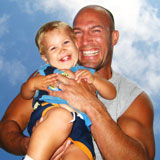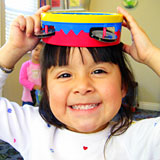Making a Smooth Transition into a Family Home Daycare
You've explored your options, interviewed potential providers, selected the childcare situation you think is best for your son or daughter, and now the big day is approaching. But how can you make the transition to the new arrangement easier? When parents think about starting their child in a new child care situation, parents tend to focus on what the transition is like for their child, but equally as important, is the transition for the parents as well. Parents too, experience pain at separation, and the younger the child, the more intense the pain. Leaving your child in someone else's care can be hard. You may worry about your child's behavior, whether or not the provider and the other children will like your child, and if the provider can understand and fulfill your child's needs. You may feel lonely, sad, or anxious at having to entrust your child to someone else. Rightfully so, parents feel protective of their children, and possibly even a little competitive with the people who help care for them. Some people may wonder whether child care is good or bad for kids, verses staying at home with mom or dad; but that's the wrong question. It implies an either-or situation and pits child care against parent care, and working moms or dads against stay-at-home moms or dads. Instead, think of child care as a support that can help your child begin to venture out into the world. Parents are always first and foremost in children's lives, but good child care can help you be the best parent you can be. At Building Blocks Home Daycare we understand and empathize with your feelings of separation. The following are examples of some of the ways that we help parents through this initial period of adjustment.
- Encouraging parents to discuss their feelings.
- Validating your feelings as a universal human experience.
- Providing parents with information about the positive effects of a quality home daycare on children.
- By encouraging positive and productive communication between parent and provider.
- Providing parents with evidence, such as photographs, that their child is enjoying the activities, and his or her interactions with others throughout the day.
- If it was a difficult drop-off, we will often follow up with a phone call on your cell phone or at work with a happy update.
- We work in partnership with you and your child to make this initial period of adjustment go as smoothly as possible.
At Building Blocks Home Daycare we understand and empathize with your child's feelings of separation anxiety that is common in the beginning. The following are examples of some of the ways that we help your child through this initial period of adjustment.
- By developing a strong and lasting bond with your child.
- By giving your child extra love and attention.
- Encouraging your child to discuss their feelings.
- By helping your child to play out themes of separation and reunion.
- Reassuring your child about his or her parent's return.
- By providing heart felt hugs when they need them.
- By providing a place where your child can feel safe and happy, and begin to build confidence and trust in his or her new environment.
A quality, family home daycare is a fun and exciting place for children to experience and learn about their world. It can be a great place for kids to interact with peers and to learn valuable life lessons such as how to share, take turns, and follow rules. These early childhood programs offer many opportunities for children to explore new surroundings and meet new friends while developing skills to use throughout their lifetime. However, beginning a new child care situation does come with its fair share of emotions, and helping your child adjust to the new surroundings can prove to be a stressful time for both you and your child. For a child, entering a new child care environment filled with unfamiliar faces can cause both anxiety and anticipation. All children need time to adjust, and all children adjust differently. There is no set adjustment period; each child is different. It may take a few hours, a few days, or a few weeks. During this time is when good communication between parent and provider is most important. Building this bond with your childcare provider will also help to ease any anxiety that you may feel during this process. As a parent, you are the major influence toward a good experience that will set the stage for many happy days in the future.
You can help your child get used to the new arrangement by easing him or her into it. If possible, we encourage parents to limit their child's time at daycare to a half-day for the first day or two; increasing in duration gradually, or what ever is comfortable for you and your child. Perhaps the most important way to help your child deal with the transition into child care, however, is for you yourself to feel as comfortable as possible with the arrangement you've chosen. Children can pick up on their parents' nonverbal cues. If you feel guilty or worried about leaving your child at daycare, he or she will probably sense that. The more calm and assured you are about your choice of childcare, the more confident your child will be. Expect some transition time, especially by age 6 months or so, when children start to experience stranger anxiety and are more attached to you. Children may respond to separation in a variety of different ways. Some may be fearful of the new arrangement and clingy when you try to leave; others may be eager to go in the morning. In the evening, one child may be irritable and demanding, wanting to be waited on or carried, while another may resist you at pick-up time, as if to "punish" you for leaving them. Such behavior is normal and will most likely fade in time. Prepare your child for their visits by talking positively about the home daycare, the other children in the home, and the childcare provider. Discuss with your child the fact that this is where he or she will be spending the day while you are at work. Frequently use the childcare provider's name and describe all the wonderful things that will fill your child's day.
On that big first day, remember to keep that positive and enthusiastic attitude as you prepare your child for their exciting day ahead. Remember; any reservations or apprehensions that you may have, will be picked up by your little one. The more cheerful your behavior is, and the more excited you appear, the more excited and relaxed your child will become. When you enter the home on the first day, calmly reintroduce the provider to your child, then step back and let your child set the tone. Allow your child to move toward the provider or other children at his or her own pace. This will allow the childcare provider to begin forming a relationship with your child. Your endorsement of the provider will show your child that he or she will be happy and safe in the provider's care.
Once inside, tell your child in a relaxed and cheerful voice, how proud you are of them, and remind them of how much fun they are going to have, how much you love them, and assure them that you will return for them right after work. Avoid phrases such as, "I'm sorry" or "I have to go to work now". Give your child a quick hug and a kiss, and say goodbye. However, always make sure your child knows you are leaving. Never sneak out when your child isn't looking! This will only increase a child's fear of separation and make them feel abandoned, even with a very young child. Because your child will not trust the environment if you suddenly evaporate into thin air, next time your child will be watching you anxiously and expecting you to disappear. Sneaking out might be easier the first time, but it will be harder on you both in the long run. Some children never cry at drop-off, and others will cry. If your child begins to get upset, the longer you stay, the more upset the child will become. If you show your child that you are reluctant to leave, you are only validating any anxiety that your child may already have, and a long farewell scene might only serve to reinforce a child's sense that daycare is a bad place. A parent's goal should be to make their child's drop off time quick and pleasant; thereby, helping to ensure the smooth running routine of the daycare. This helps your child, the other children, and the childcare provider to have the best experience possible, each and every day.
A consistent and predictable farewell ritual can make leaving easier. Some parents wave from outside a certain window, or make a funny good-bye face, whereas others read a short book before parting. Also, keep in mind that most children do well once their parents leave. It may be very hard to believe, but children generally do calm down almost immediately after the parent leaves the building. This is when your child is comforted by the provider and is introduced to his or her new friends. Most children are done crying by the time the parent is even out of the driveway. Trust your provider. They have been through this dozens of times and know what to do with your child.
In order to continue a smooth transition from the first day onward, you and your child should establish a consistent daily routine. Discuss with your child things such as; "Tomorrow you can play with all of your new friends again!" Bottom line, if you see positive things in your child's daycare, chances are you can head off to work knowing your child will be just fine. Separation anxiety is normal in young children. But it can be difficult to head off to work when your child's cries are echoing in your head. However, if you follow these steps to making drop off times more relaxed and happy, you and your child will both learn to work through separation anxiety together. With consistency and a well practiced routine, your child will make a quick adjustment to daycare; and just think of all the friends they will make, and fun experiences they will have to fill their day!
Additionally, we offer parents the following tips to help ease separation anxiety.
- If your child has not been used to getting up early, you may consider getting them into an earlier bedtime routine a week or two before starting daycare, and allowing them to awaken at an earlier time in the morning.
- If your child is required to bring their own sheet, blanket, and pillow let him/her pick them out during a special shopping trip! "How about a new backpack to bring home all of your beautiful arts & crafts that you'll be making?"
- Organize your morning routines to allow for a little extra time during drop off. Children feel your frustration or anxiety for being late for work and will cling to you longer.
- Let your child bring a piece of home with them; a special blanket, toy, or teddy can be very comforting. Photos of family members, neighbors, and pets can be left with us to help remind your child of familiar people if he or she feels lonely during the day.
- Expect crying and clinging, at least during the initial period of adjustment.
- When you're getting ready to leave, tell your child when you'll be back. Show your child on the clock, even if he or she can't tell time yet. Say, "When the little hand is on the five, I'll be back."
- You can give your child a special job, for example, allow them to hold your sunglasses for the day, saying that you will be back to get them for the drive home.
- Do not linger too long in the daycare, even if your child is unhappy. Do your best to settle your child into an activity, say your goodbyes, and give hugs and kisses, then make your exit. This is where that strong bond between you and your child's provider comes in handy.
- Be on time when you pick up your child. Picking up your child every day around the same time will help build your child's trust and help him or her understand that he or she is not being abandoned.
- Your child may temporarily regress during her adjustment to child care. Thumb-sucking, wetting pants, and other behaviors may occur. The less attention you pay to these behaviors, the sooner they will disappear.





